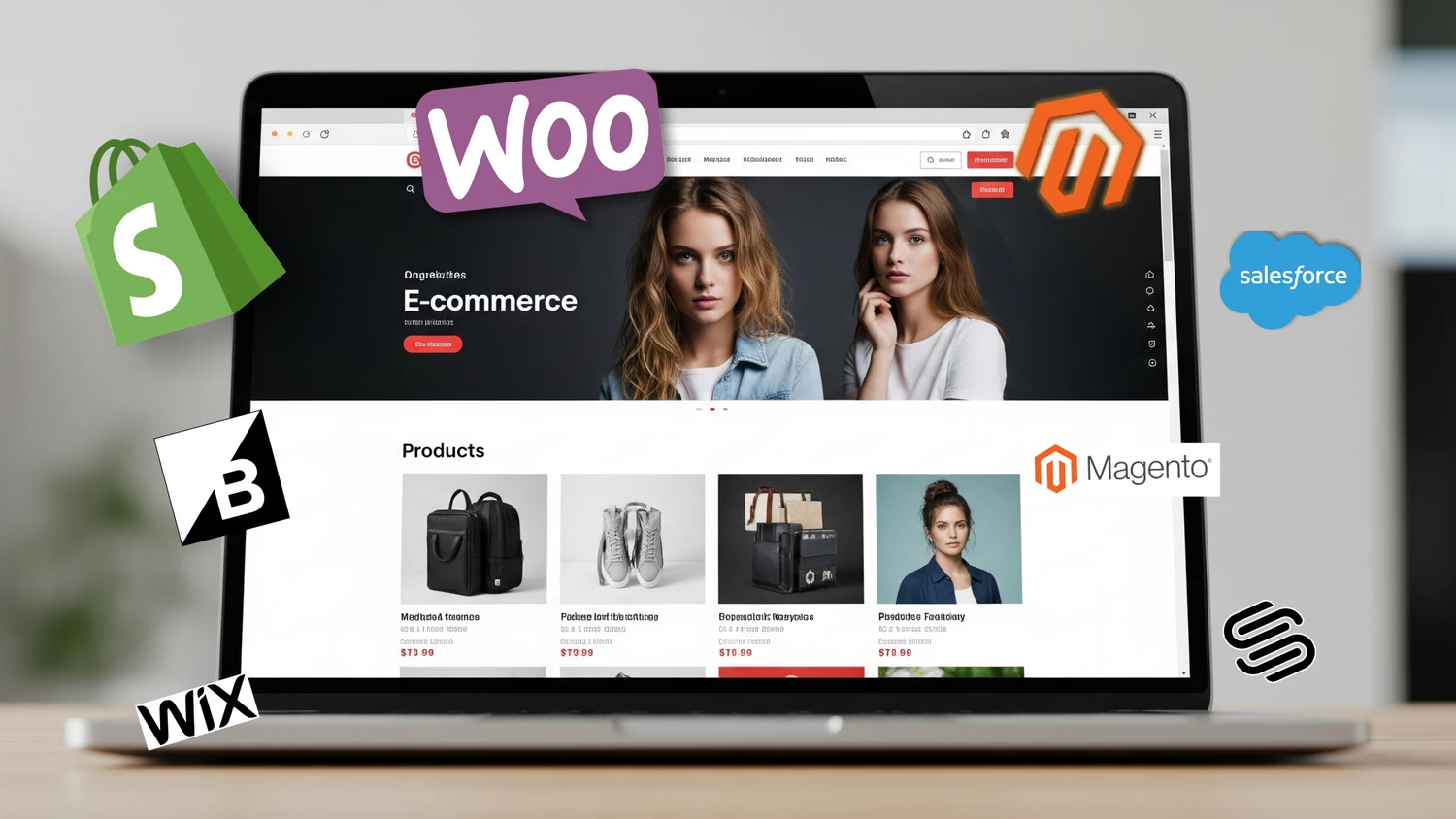Choosing the best e-commerce platform for your UK business can feel like a huge task. After all, your online store is the digital face of your brand, and selecting the right foundation is crucial for success. This article will help you navigate the options, comparing the top e-commerce platforms available to UK businesses and highlighting their features, pricing, and suitability for various needs.
Let’s dive into some of the leading contenders in the e-commerce arena.
The most popular e-commerce platforms
Shopify
Shopify is arguably one of the most well-known e-commerce platforms, offering a comprehensive suite of tools for businesses of all sizes. It’s particularly popular for its user-friendliness and extensive app store. This platform truly simplifies setting up an online shop.
Shopify offers various plans, each with different features and transaction fees. The basic plan is often sufficient for new businesses, while larger enterprises might opt for advanced options that include more robust reporting and lower transaction rates. You’ll find that it integrates seamlessly with many popular payment gateways.
Pros of Shopify:
- Ease of use: Setting up a store is straightforward, even for those without technical expertise.
- Extensive app store: A vast marketplace of apps allows for customisation and added functionality.
- 24/7 support: Help is readily available whenever you encounter an issue with this e-commerce platform.
- Scalability: It’s important you choose an e-commerce platform that will grow with your business. Shopify is scalable, from a small startup to a large enterprise.
Cons of Shopify:
- Transaction fees: Unless you use Shopify Payments, additional fees apply.
- Customisation limitations: While apps add functionality, deep customisation can be restricted.
- Cost: Monthly fees and app subscriptions can add up, especially for smaller businesses.
WooCommerce
WooCommerce is not a standalone e-commerce platform but rather a powerful open-source e-commerce plug-in for WordPress. This means you need a WordPress website to use it. Many UK businesses find this appealing due to the flexibility and control it offers. It’s also often a more budget-friendly option for those already familiar with WordPress.
Since WooCommerce is open-source, you have full control over your store’s code and design. This can be a huge advantage for businesses with specific requirements or those looking for a highly customised solution. However, it does require more technical knowledge than a hosted platform like Shopify. So, you may need some developer support if you use this e-commerce platform.
Pros of WooCommerce:
- Flexibility and control: You have complete ownership and customisation capabilities.
- Cost-effective: The plug-in itself is free, though you’ll need to pay for hosting, themes, extensions, and any developer support.
- Large community support: As a WordPress plug-in, there’s a vast community for support and resources.
- SEO friendly: WordPress is inherently good for SEO, and WooCommerce benefits from this.
Cons of WooCommerce:
- Technical expertise required: You’ll need some knowledge of WordPress and potentially coding.
- Self-hosting: You are responsible for hosting, security, and maintenance (but if you have a WordPress site already, you’ll be part of the way there anyway).
- Reliance on third-party plug-ins: While offering flexibility, this can also lead to compatibility issues and a need to constantly update plug-ins for security patches.
Magento
Magento, (now Adobe Commerce,) is a robust and highly scalable e-commerce platform designed for large businesses and enterprises. It offers unparalleled flexibility and customisation options, making it a powerful choice for those with complex needs. Many global brands utilise Magento for their online stores.
While incredibly powerful, Magento comes with a steeper learning curve and higher development costs than other e-commerce platforms. It’s generally not recommended for small businesses due to its complexity and resource requirements. However, for businesses needing a truly bespoke e-commerce solution, it can be an excellent choice.
Pros of Magento:
- Unrivalled flexibility: Virtually limitless customisation and integration possibilities.
- Scalability: Built to handle massive product catalogues and high traffic volumes.
- Powerful features: Advanced marketing tools, multi-store capabilities, and more.
- Strong SEO capabilities: Offers comprehensive SEO features out of the box.
Cons of Magento:
- High cost: Implementation, development, and maintenance are expensive.
- Technical expertise: Requires skilled developers to set up and manage.
- Resource intensive: Demands significant server resources.
- Complex user interface: Not as intuitive as other platforms for daily operations.
BigCommerce
BigCommerce is another popular hosted e-commerce platform, often seen as a direct competitor to Shopify. It caters to a wide range of businesses, from small startups to rapidly growing enterprises. BigCommerce prides itself on offering more built-in features than many of its rivals, reducing the need for numerous apps.
This platform provides strong SEO capabilities, flexible product options, and a robust set of marketing tools. Its tiered pricing structure allows businesses to scale without having to migrate platforms entirely. This makes it a good long-term option for many small businesses and start-ups that don’t want to migrate to a new e-commerce platform as they need to scale their business.
Pros of BigCommerce:
- Extensive built-in features: Reduces reliance on third-party apps.
- No transaction fees: Unlike Shopify, BigCommerce doesn’t charge transaction fees on sales.
- Scalability: Suitable for businesses of all sizes, with plans that grow with you.
- Strong SEO tools: Designed to help your products rank higher in search results.
Cons of BigCommerce:
- Sales thresholds: You automatically upgrade to a more expensive plan once you hit a certain sales volume.
- Fewer free themes: Compared to some competitors, there are fewer free design options.
- Learning curve: Can be slightly more complex than Shopify for beginners.
Other e-commerce platforms
While Shopify, WooCommerce, Magento, and BigCommerce are dominant players, several other excellent e-commerce platforms cater to specific niches or offer unique advantages. Exploring these options can broaden your search for the best e-commerce platform for your UK business.
Consider platforms like:
Squarespace, known for its beautiful design templates, ideal for creative businesses or those prioritising aesthetics.
Wix E-commerce offers an incredibly easy drag-and-drop website builder, perfect for small businesses and individuals.
For larger UK businesses with specific ERP integrations, platforms like Salesforce Commerce Cloud might be more suitable, although they also come with higher costs and complexity.
Each of these alternatives presents a different approach to building an online store.
Choosing the right e-commerce platform for your business
Selecting the best e-commerce platform is a critical decision. It impacts everything from your daily operations to your long-term growth potential. Therefore, take your time to assess your unique business needs before committing to a platform.
Here are some key factors to consider when making your choice:
- Budget: What are your upfront and ongoing costs for the platform, hosting, and extensions?
- Scalability: Can the platform grow with your business as your sales and product catalogue expand?
- Ease of use: How easy is it to set up, manage, and update your online store?
- Features: Does the platform offer the essential functionalities you need, such as inventory management, payment gateways, and marketing tools?
- Customisation: Do you need extensive design flexibility or specific integrations?
- Support: What kind of customer support is available if you encounter issues?
- SEO capabilities: How well does the platform support search engine optimisation to help customers find your products?
Don’t forget to consider your technical expertise. If you have limited technical knowledge, a hosted solution like Shopify or BigCommerce might be more suitable. However, if you have access to developers or are comfortable with more hands-on management, WooCommerce or Magento could be excellent choices.
Need help choosing an e-commerce platform? Contact Redcentaur for expert advice.
Further reading
Website development UK: A complete guide for businesses





